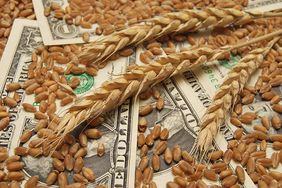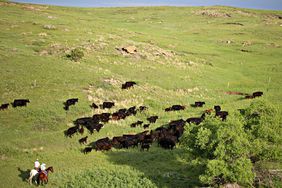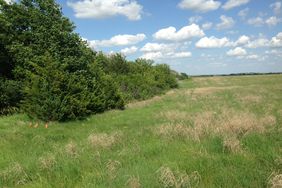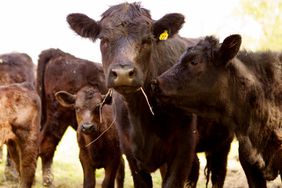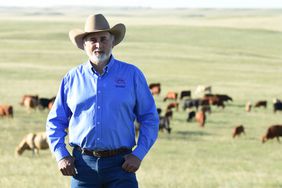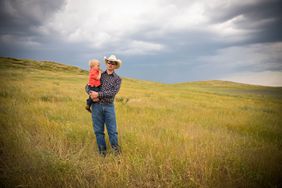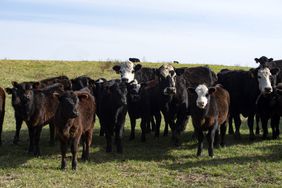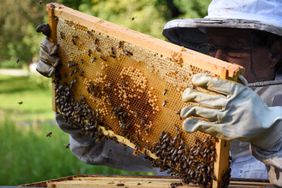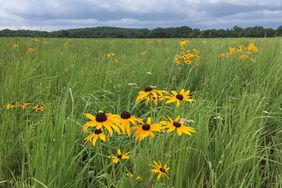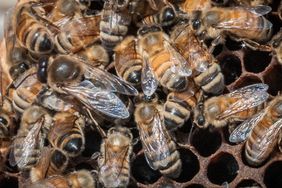:max_bytes(150000):strip_icc()/Neuharth.060-2000-3ad31e6fd93a455db10bd76079452fd3.jpg)
Prairie Paradise Farms, run by Levi Neuharth and his wife, Crystal, in Stanley County, South Dakota, is the picture of diversity.
Hens preen their feathers in the dust beneath an old, red feed wagon as a pair of peacocks clamber atop a hay rack, proudly unfurling their huge, multi-color fans. They stretch out their necks and crack the still morning air with shrill screams. Pheasants cackle in a distant field, the roosters claiming territory in turf wars.
In the dusky blue gesture of morning, goats bleat as they're led toward a faded barn by small children, eager to be milked and fed.
Herds of dark cattle dot the horizon a half mile off the lane road, all facing one direction, heads down, grazing and content.
- READ MORE: How grazing management transforms grasslands
A llama, with his mouth bulging with feed, chews crazily as he eyes a pen of grunting pigs that push and shove each other, a young, blonde boy dumping buckets of feed into their trough.
Not only is there diversity in livestock, but the Neuharths maintain a diverse crop rotation that incorporates grazing cattle as well. They run about 2,300 acres of farm ground and about 3,000 acres of grassland.
For their work, the Neuharths are winners of the 2021 Leopold Conservation Award, an award that recognizes private landowners who inspire others with their dedication to the land, water, and wildlife resources in their care. The award is given in honor of renowned conservationist, Aldo Leopold.
"Winning the Leopold award has been a very big honor," Levi says. "It's very humbling."
Crystal agrees, "It leaves us speechless. To be thought of in light of some of the other farmers and ranchers that have been award winners – it's so rewarding to see that our hard work is making a difference and we hope to continue sharing our message."
:max_bytes(150000):strip_icc()/Neuharth.031-2000-f5b8647b6e6e4cc1a051eaf2b435ea80.jpg)
The Neuharths: (Back) Crystal, Johnathon, Kaydee, Levi, and Justin (Front)
| Developing a Legacy |
|---|
| [object Object] |
:max_bytes(150000):strip_icc()/Neuharth.012-2000-2bf115308e334410857e9b9f961c12fa.jpg)
Farming Practices
The Neuharths used to operate as season-long grazers, but have switched to a rotational system that keeps living roots in the ground longer.
Over time, they turned some farm ground into grass, which has encouraged wildlife populations of pheasants and deer to flourish.
Crystal pipes in, "It is very rewarding to notice the amount of wildlife we see when we go for a drive. It's not unusual to see pheasants, prairie chickens, grouse, and deer with babies. It's very peaceful, and knowing that we provide the habitat for them to sustain their numbers is wonderful."
"That grass has also been put into our rotational grazing methods, allowing us to add more cattle," Neuharth explains. "We've also put new fencing around the whole section of expired CRP and an old hay ground, and are turning that into our rotation as well."
Their practices also are a big benefit during extremes in weather.
"This year it's been very, very dry," Neuharth mentions. "And for the most part, we have been able to harvest a quality crop. I feel that our practices have helped that crop try to survive as much as possible with retaining moisture from the years before."
"When we harvest winter wheat with our stripper header, we leave the residue," Neuharth says. "We just take off the heads. That residue is a friend of mine. When it gets dry, it helps keep the ground cool and keep the biology alive and it gives time for that moisture to work for the crop."
:max_bytes(150000):strip_icc()/Neuharth.069-2000-dd1a50d847f04af9ba6efdcce6b1e291.jpg)
He says patience and the right tools will help make your crop shine even in challenging weather.
Crystal steers the conversation toward sustainability. "Dr. Dwayne Beck of the Dakota Lakes Research Farm in Pierre always told us stop and walk out into nature and just have a look, see what she's been doing. If we can take what we learn from Mother Nature and apply it to our practices, then we can become more successful. Our crops and grass should be resilient and recover."
The Neuharths have learned from Dr. Beck that the ultimate goal is to try to mimic the natural energy, water, and nutrient and cycles and the diversity on the native landscape.
Crystal adds that one of the most important strategies they've implemented is to embrace diversity.
"Not all of our eggs are in one basket," she says. "We're diversified to lessen risk and to try to capture the best of what Mother Nature gives us for moisture and weather."
:max_bytes(150000):strip_icc()/Neuharth.006-2000-a71fabe5625f41f9a204f6a5d1667d3a.jpg)
Family Legacy
The Neuharth kids, Johnathon, Justin, and Kaydee are the engine that drives the farm forward.
Crystal shares her memory of Johnathon returning home from a conference in North Dakota where he heard about a crisis involving songbirds. It was his recommendation to read the Aldo Leopold book and discover what bird species were already at the ranch.
"Sometimes we don't see the big picture," Crystal says. "Johnathon's eyes were opened by going to different conferences, and that has also opened our eyes in different ways as well. It's been amazing to have our kids be passionate about the land and making a difference."
A dream the Neuharth boys have is to create a farm-to-table experience with tours to show people where their food is grown.
"It's exciting for us to think that they are thinking holistically about how to share the experience with others in that way," Crystal grins proudly.
Prairie Paradise Farms continues to change, and quickly.
A lesson that has stuck with Neuharth is one he learned at a conference: "If you don't change something within the first seven to 10 days thinking about it, you weren't going to change something at all."
"We wanted to add chickens to the operation, so we came home and added chickens within the week. Our son had milk allergies, so we added dairy goats. And now it's become a very lucrative dairy goat herd and the kids love to show them."
As the Leopold Conservation Award recognizes, the Neuharths are examples to others and hope to inspire fellow landowners to do more.
"I think the biggest misconception people have in farming and ranching is that soil health is too much work and so they don't manage their pastures for soil health," Neuharth says. "They think that it takes too much time to go out there and put up a fence. But really it is rewarding work and it does so much good for the pastures that it's worth doing."
He sums it up. "A good day on the farm is being able to take the kids out, check the cows and be together. It's great to have the family on the farm and to see all of nature's beauties."
It's all about the future.
:max_bytes(150000):strip_icc()/Neuharth.010-2000-0af2f565f57d42089f998509ace3bada.jpg)
| Cultivating Community |
|---|
| What sets the Neuharths apart is their focus on youth and community education. |

